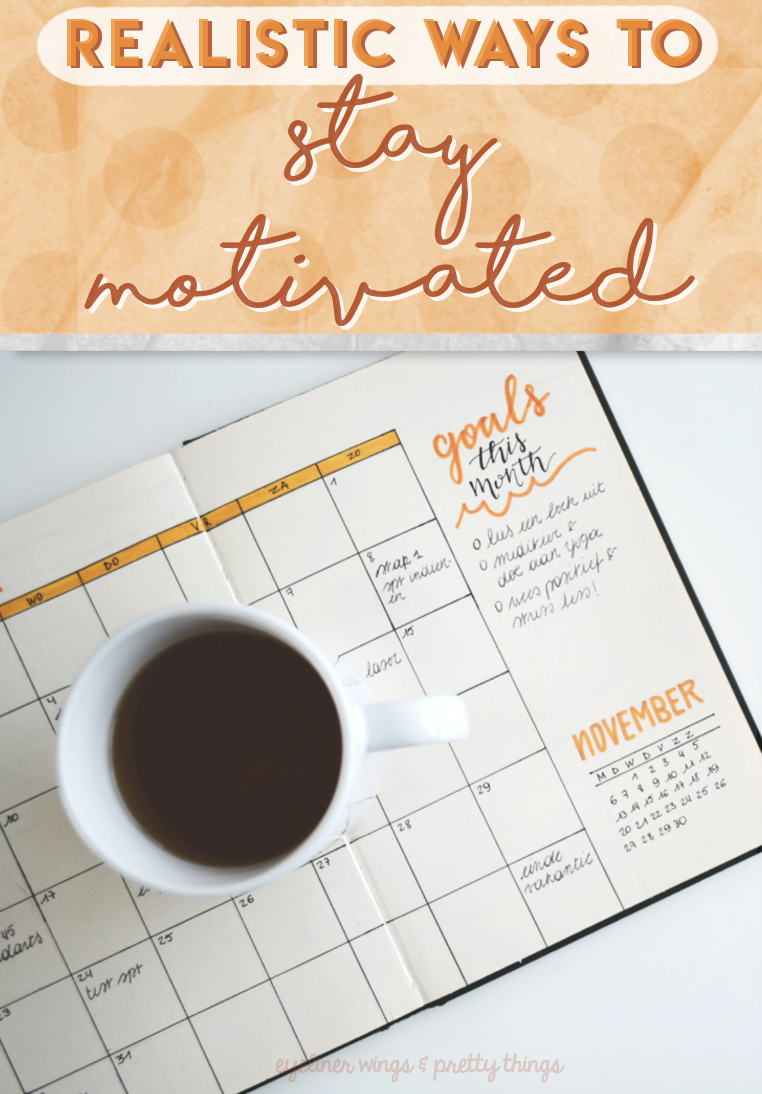
Staying motivated is never an easy feat, and it’s an especially tricky one when the world seems to be (is?) crumbling during a global pandemic. But even if the world is crumbling, you don’t have to be!
I’m usually pretty good at staying motivated, but I find myself falling into slumps whenever I’m not sure what I’m working toward or why. I LOVE a project with a clear vision or goal, but when I don’t have those things sometimes I find myself giving up or drifting off into a series of “What’s the point?” thoughts.
Sadly, beautiful bullet journals and inspiring Ted Talks do very little for me in terms of setting goals and achieving them.
And so, I’ve gathered some of my best, practical ways to stay motivated in hopes it might help you set and smash some goals… and maybe it’ll help me get back on track, too.
1. Set a goal that is tangible and practical.
By setting yourself a super vague, seemingly impossible goal you’re giving yourself an out and doing yourself a disservice.
For example, “get in shape” is a terrible goal because it’s so vague. What does getting in shape mean to you? Break it down and figure it out. Maybe your true goal is being able to do 50 push-ups or run around the block without stopping to catch your breath.
Also make sure your goal isn’t setting you up for failure — this will make it easier to give up. For example, don’t set a goal that’s “lose 30 pounds by next month” or “learn French before my trip in two weeks” because of how out of reach and impractical those goals are, you’ll likely give up before you’ve even started.
An impossible goal is pointless to set and is much closer to a dream. Instead, break down the goal into “do 30 minutes of cardio each day for a month” or “learn 30 basic French phrases before my trip.”
One last example to hammer this point in. If you set the goal: “Become a master at making coffee” it will seem so insurmountable and unmeasurable that you’ll likely do very little to achieve it. Or, you’ll convince yourself you’ve accomplished it by doing the bare minimum. Also, what does this goal even mean? A better goal might be: “Learn how to make a tasty latte, cappuccino, and macchiato.”
2. Buy yourself something that’ll actually be useful on your journey to achieve this goal.
This shouldn’t be a reward, but rather a resource of sorts. For example, buy a domain name if your goal is to start a cooking blog that you post on weekly or new running shoes if your goal is to finish a 5K.
Sometimes investing money into something will motivate you to follow through, especially if you’re a pretty cheap person. For me, buying a domain name forced me to keep up with my blog because I hate wasting money.
Again, make sure you’re buying a resource or a tool, not a reward for simply deciding to start something. It should be useful and help you achieve your goal in some way. For example, if your goal is to master making three coffee drinks, pick up a fancy canister of espresso or a French press … not a super cute mug.
3. Create a timeline to help you stick to your goal.
To be able to do Z by a certain date, when should you be achieving X and Y? Start at your final goal and walk backward.
To be able to make a latte, do you first need to learn how to create the perfect shot of espresso? Maybe set that as your first mini goal and then work up. Your next goal may be learning how to froth milk.
To run a 5K, maybe you first need to be able to run one mile without taking breaks. To get a job, maybe your first task is to makeover your resume and LinkedIn.
Think of your goal as something at the top of a set of stairs. What’s on each step? Which tools or skills do you need to have collected or learned in order to make your way to the top? Break down your goal into bite-sized pieces and map out how you’ll…eat them? Sure, that simile works.
This can help you create a progress sheet (more on that later), which can keep you focused on your final goal.
4. Track your progress with an actual spreadsheet or piece of paper.
It’s so easy to minimize your achievements and forget your hard work if you don’t keep track of everything with a progress sheet.
Take notes of your wins and losses or journal about your progress as you work toward your goal. You can use an app or physical calendar to track the days you practice or hit a new milestone.
Even if you aren’t able to achieve your goal, seeing how much you’ve done and how far you’ve come can help you stay motivated to keep going.
5. Figure out your roadblocks, and eliminate them.
What’s holding you back? Don’t say “myself.” That means nothing. We are all holding ourselves back in some way, but the real question is how are we doing that? What about you is holding you back? Really think about it.
If your habit of sleeping in is holding you back from going on morning runs, set alarms, sleep in your workout gear, or get a running buddy who will keep you accountable. Keep trying to eliminate a roadblock until you do.
If your issue is that you’re struggling for a reason to achieve your goal, think of what great things it could lead to.
For example, if you get a job, you’ll make enough money to finally move out or go on an epic trip with friends this fall. If you master some specialty coffee drinks, you won’t have to spend money on Starbucks and you’ll be able to make tasty drinks for the people you love.
Sit down and think about why you have been straying from your path. Maybe it’s that your goal was too vague or you weren’t sure how to get there. If that’s the case, try talking to a friend or parent or even someone who has achieved the goal you have in mind.
Sometimes advice or a little pep talk can help you discover your roadblocks and knock them down. I encourage you to speak to someone who seems pretty on top of their business and who will give you some no-nonsense truths.
6. Set a deadline.
Even if you don’t accomplish your goal by this deadline, it forces you to take action NOW instead of later.
For example, if your goal is to master those three specialty coffee drinks, think about why you want to do it. Do you want to be able to show off your coffee skills and be a barista for your friends and the annual girls’ brunch next month? Perfect. There’s your concrete date and a purpose for your goal.
When possible, sign up for an event or course that’ll force you to have accomplished all or some of your goal by that point, like an actual 5K race or art showcase.
If your goal is entirely for yourself (ie: redecorate your bedroom), talk to other people and tell them your deadline. Maybe plan a little event (like a bedroom reveal) that will force you to stay accountable. Sometimes having others hold you accountable is exactly what the doctor ordered.
If your goal is something that’s not entirely up to you, give yourself an ideal one that you can control. Sure, you can’t control if you get a job by June 30, but you can control if you apply to at least 50 jobs by then.
7. Join a community of people who are in the same boat or surround yourself with people who are where you want to be.
There are tons of places to find a community online (or in real life) where you can speak to others who are trying to go down the same path. This is a great way to get advice or get help breaking down your roadblocks.
Follow relevant pages and profiles, join subreddits with advice about what you’re going through, and replace your morning music playlist with podcasts related to your goal.
Want to master some coffee drinks? Follow your favorite cafes and some baristas on Instagram. Trying to run a 5K? Join an online community of people who are also at the start of their journey.
By truly immersing yourself in your goal, you can help keep yourself inspired and on track.
What’s your next goal?
I think mine is to learn how to use a French press (just ordered one!) and create the perfect cup of coffee since I’m working from home until at least the fall.

Keep Reading:
The Guide to Setting Goals and Actually Achieving Them
10 Goals To Set This Summer
How to spend money without feeling stressed and guilty





